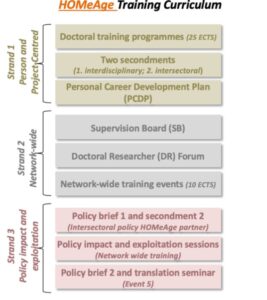The HOMeAGE training curriculum and approach responds to a European Commission strategy report on the Silver Economy, which identified ‘solution areas’ and innovation ‘sticking points’ (e.g.,ageing friendly environment development; product innovation for independent living; integrated care services and improved connectivity) that need to be addressed. But it is also predicated on best practice for DR training, including the Salzburg Principles and Principles for Innovative Doctoral Training.
HOMeAGE delivers core fundamentals regarding high quality supervision, scientific excellence, transferable skills and career development. The curriculum draws on the Eurodoc Report Matrix on transferable skills and competences to inform a structured approach to career development, cognitive, digital, communication, interpersonal, mobility, enterprise, and teaching and supervision skills. This approach is integrated across the three strands.

Strand 1 – Person and Project Centered
All Doctoral Researchers (DRs) receive training through research by means of individual research projects (IRP’s). Along with experiential learning, and receiving support to conduct this research, these projects will involve meaningful knowledge exchange opportunities and exposure to different sectors and research environments through two secondments, enhancing DR mobility.
All DRs undertake doctoral training programmes, worth approximately 25 ECTS (European Credit Transfer and Accumulation System) within academic host institutions. DRs receive structured training on transferable skills and specialised methods required for their research projects.
DRs develop a Personal Career Development Plan (PCDP) in collaboration with their supervisors. The plan is based on skills gap identification and development, and reflects short-term (0-5 years), medium-term (5-10 years) and long-term career objectives (10 years plus).
Strand 2 – Network-wide training
DRs are enrolled in network-wide training addressing cross-cutting topics and skills, which will account for approximately 10 ECTS per DR and is recognised across all host organisations. Designed to augment the host (academic awarding) institution doctoral training programme, network (1) wide training has four objectives, providing: (1) interdisciplinary and intersectoral knowledge of ageing in place; (2) transferable skill sets with intersectoral and career development relevance; (3) understanding of interconnections between challenges; and (4) collective peer-supported learning and collaboration.
Network-wide training involves three components.
A Doctoral Researcher Forum was established as a peer-support network and will provide a collegial space for knowledge exchange and methodological discussion.
A HOMeAGE Project Support Team (PST) was established for each DR with the aim of ensuring a match between network-wide training and DR needs (through entry and exit meetings at each event), IRP alignment with HOMeAGE objectives, and provides an additional quality and welfare check.
Five network-wide 3-day training events which are held across the 36-month duration and comprises: one kick-off meeting (Event 1 – on research and policy frameworks on ageing in place; three training masterclasses (Events 2-4) – on one challenge each; and one closing event (Event 5) – on impact pathways and exploitation.
Strand 3 – Policy impact training
Policy Impact and training features as a part of the network-wide training events, as described above. It involves secondments in a HOMeAGE partner organisation that is engaged in policy development and impact on ageing in place. During the course of the HOMeAGE Training programme the DR s will also complete 2 Policy Briefs connected to their projects. The first set of Policy Briefs are available here.